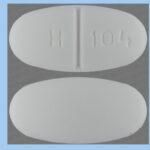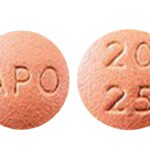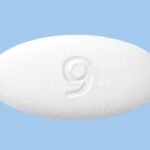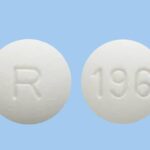G 10 Pill: Uses, Dosage, Side Effects, Warnings
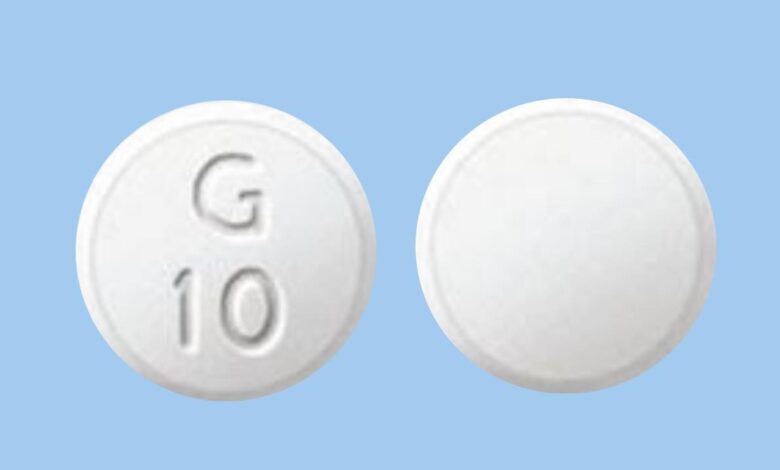
The white, round pill with the imprint G 10 has been identified as Metformin Hydrochloride 500 mg supplied by Ingenus Pharmaceuticals, LLC. G 10 pill is used alone or with other medications, including insulin, to treat type 2 diabetes (condition in which the body does not use insulin normally and, therefore, cannot control the amount of sugar in the blood). Metformin is in a class of drugs called biguanides.
Metformin helps to control the amount of glucose (sugar) in your blood. It decreases the amount of glucose you absorb from your food and the amount of glucose made by your liver. Metformin also increases your body’s response to insulin, a natural substance that controls the amount of glucose in the blood. Metformin is not used to treat type 1 diabetes (condition in which the body does not produce insulin and therefore cannot control the amount of sugar in the blood).
Over time, people who have diabetes and high blood sugar can develop serious or life-threatening complications, including heart disease, stroke, kidney problems, nerve damage, and eye problems. Taking medication(s), making lifestyle changes (e.g., diet, exercise, quitting smoking), and regularly checking your blood sugar may help to manage your diabetes and improve your health. This therapy may also decrease your chances of having a heart attack, stroke, or other diabetes-related complications such as kidney failure, nerve damage (numb, cold legs or feet; decreased sexual ability in men and women), eye problems, including changes or loss of vision, or gum disease. Your doctor and other healthcare providers will talk to you about the best way to manage your diabetes.
What should I tell my health care provider before I take G 10 pill?
They need to know if you have any of these conditions:
• anemia
• dehydration
• heart disease
• frequently drink alcohol-containing beverages
• kidney disease
• liver disease
• polycystic ovary syndrome
• serious infection or injury
• vomiting
• an unusual or allergic reaction to metformin, other medicines, foods, dyes, or preservatives
• pregnant or trying to get pregnant
• breast-feeding
How should I take G 10 pill?
Take G 10 pill by mouth with a glass of water. Follow the directions on the prescription label. Take this medicine with food. Take your medicine at regular intervals. Do not take your medicine more often than directed. Do not stop taking except on your doctor’s advice.
Talk to your pediatrician regarding the use of this medicine in children. While this drug may be prescribed for children as young as 10 years of age for selected conditions, precautions do apply.
Overdosage: If you think you have taken too much of this medicine, contact a poison control center or emergency room at once.
NOTE: This medicine is only for you. Do not share this medicine with others.
What if I miss a dose?
If you miss a dose, take it as soon as you can. If it is almost time for your next dose, take only that dose. Do not take double or extra doses.
What may interact with G 10 pill?
Do not take this medicine with any of the following medications:
• certain contrast medicines given before X-rays, CT scans, MRI, or other procedures
• dofetilide
This medicine may also interact with the following medications:
• acetazolamide
• alcohol
• certain antivirals for HIV or hepatitis
• certain medicines for blood pressure, heart disease, irregular heart beat
• cimetidine
• dichlorphenamide
• digoxin
• diuretics
• female hormones, like estrogens or progestins and birth control pills
• glycopyrrolate
• isoniazid
• lamotrigine
• memantine
• methazolamide
• metoclopramide
• midodrine
• niacin
• phenothiazines like chlorpromazine, mesoridazine, prochlorperazine, thioridazine
• phenytoin
• ranolazine
• steroid medicines like prednisone or cortisone
• stimulant medicines for attention disorders, weight loss, or to stay awake
• thyroid medicines
• topiramate
• trospium
• vandetanib
• zonisamide
This list may not describe all possible interactions. Give your health care provider a list of all the medicines, herbs, non-prescription drugs, or dietary supplements you use. Also tell them if you smoke, drink alcohol, or use illegal drugs. Some items may interact with your medicine.
What should I watch for while using this medicine?
Visit your doctor or health care professional for regular checks on your progress.
A test called the HbA1C (A1C) will be monitored. This is a simple blood test. It measures your blood sugar control over the last 2 to 3 months. You will receive this test every 3 to 6 months.
Learn how to check your blood sugar. Learn the symptoms of low and high blood sugar and how to manage them.
Always carry a quick-source of sugar with you in case you have symptoms of low blood sugar. Examples include hard sugar candy or glucose tablets. Make sure others know that you can choke if you eat or drink when you develop serious symptoms of low blood sugar, such as seizures or unconsciousness. They must get medical help at once.
Tell your doctor or health care professional if you have high blood sugar. You might need to change the dose of your medicine. If you are sick or exercising more than usual, you might need to change the dose of your medicine.
Do not skip meals. Ask your doctor or health care professional if you should avoid alcohol. Many nonprescription cough and cold products contain sugar or alcohol. These can affect blood sugar.
This medicine may cause ovulation in premenopausal women who do not have regular monthly periods. This may increase your chances of becoming pregnant. You should not take this medicine if you become pregnant or think you may be pregnant. Talk with your doctor or health care professional about your birth control options while taking this medicine. Contact your doctor or health care professional right away if you think you are pregnant.
If you are going to need surgery, an MRI, CT scan, or other procedure, tell your doctor that you are taking this medicine. You may need to stop taking this medicine before the procedure.
Wear a medical ID bracelet or chain, and carry a card that describes your disease and details of your medicine and dosage times.
This medicine may cause a decrease in folic acid and vitamin B12. You should make sure that you get enough vitamins while you are taking this medicine. Discuss the foods you eat and the vitamins you take with your health care professional.
What are the side effects of G 10 pill?
Side effects that you should report to your doctor or health care professional as soon as possible:
• allergic reactions like skin rash, itching or hives, swelling of the face, lips, or tongue
• breathing problems
• feeling faint or lightheaded, falls
• muscle aches or pains
• signs and symptoms of low blood sugar such as feeling anxious, confusion, dizziness, increased hunger, unusually weak or tired, sweating, shakiness, cold, irritable, headache, blurred vision, fast heartbeat, loss of consciousness
• slow or irregular heartbeat
• unusual stomach pain or discomfort
• unusually tired or weak
Side effects that usually do not require medical attention (report to your doctor or health care professional if they continue or are bothersome):
• diarrhea
• headache
• heartburn
• metallic taste in mouth
• nausea
• stomach gas, upset
This list may not describe all possible side effects. Call your doctor for medical advice about side effects. You may report side effects to FDA at 1-800-FDA-1088.
Where should I keep my medicine?
Keep out of the reach of children.
Store at room temperature between 15 and 30 degrees C (59 and 86 degrees F). Protect from moisture and light. Throw away any unused medicine after the expiration date.
NOTE: This sheet is a summary. It may not cover all possible information. If you have questions about this medicine, talk to your doctor, pharmacist, or health care provider.

